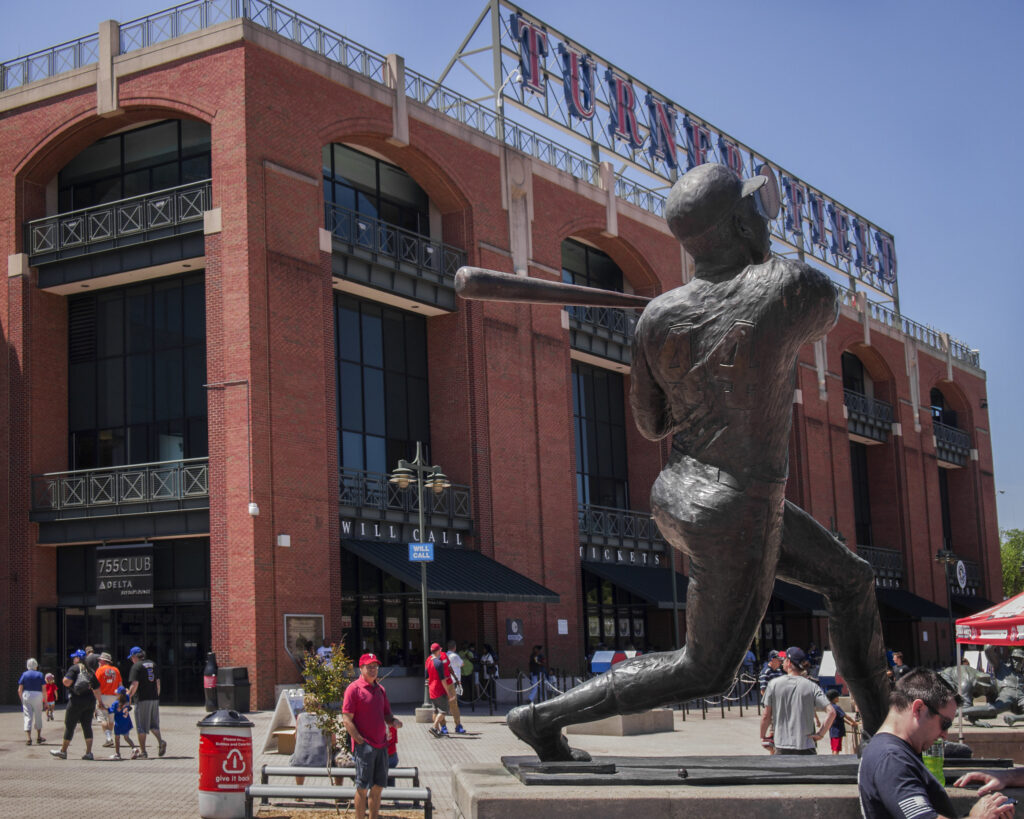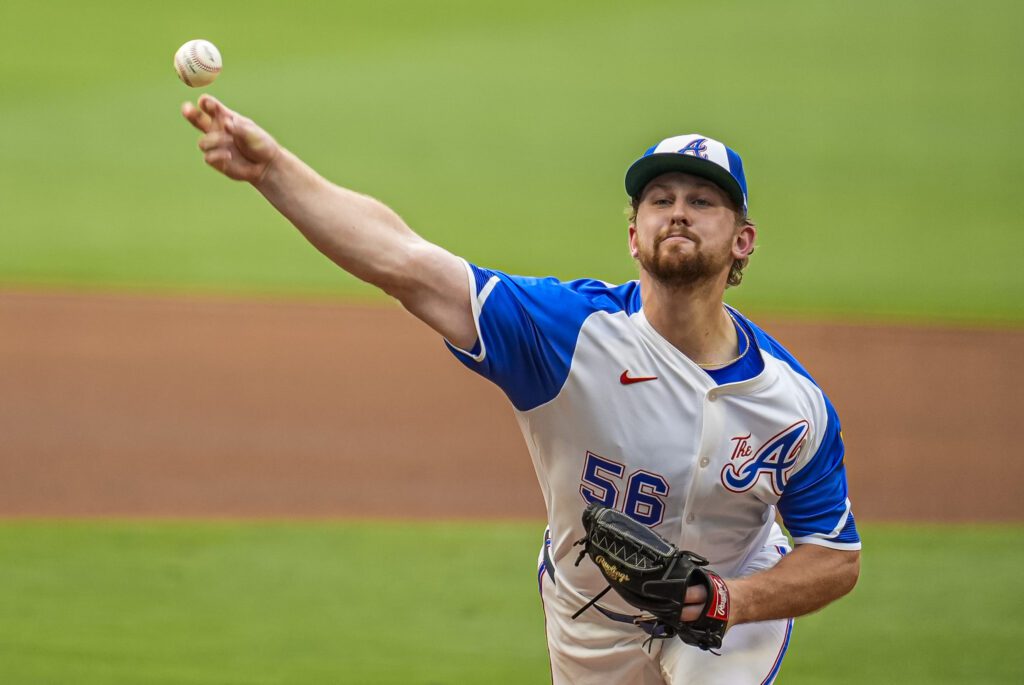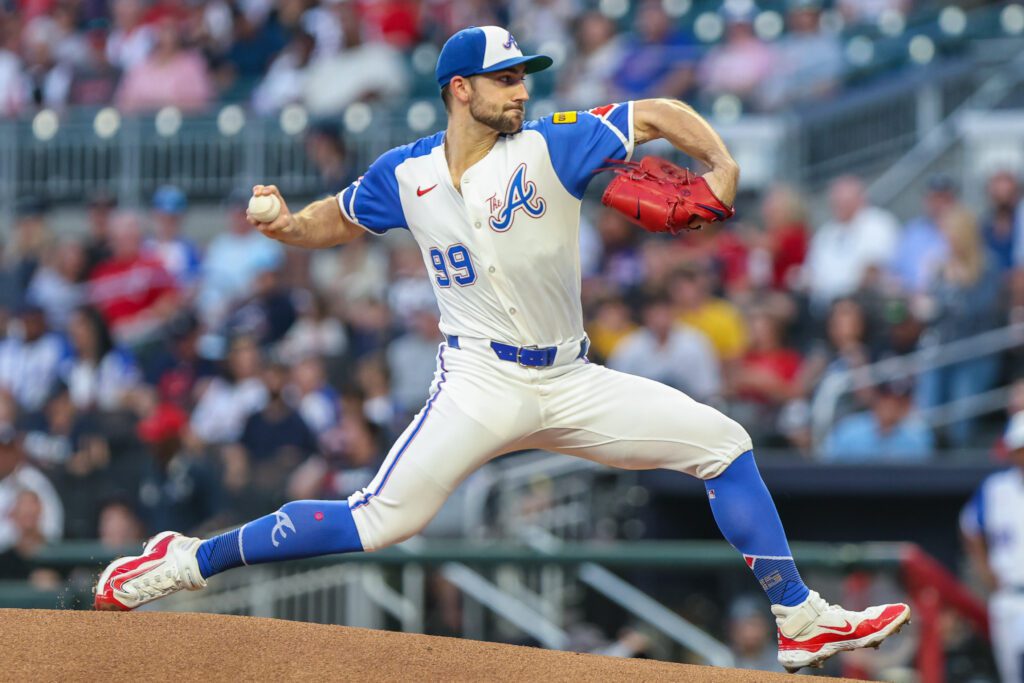This is the fourth in a series that looks at the five best players at each position for every Atlanta Braves, a team that won the World Series in 2021.
A team with nearly 150 years of history should have quite a few elite players in their lineup. The Braves have four Hall of Famers among their top outfielders and two more that could be inducted in the near future. Among those is arguably the greatest power hitter in Major League history.
The Best Outfielders in Atlanta Braves History
Left Fielders
5. Sid Gordon – He spent four years with the Braves (1950-53) and was with the team during the move from Boston to Milwaukee. Gordon had a .289 average, 582 hits, 100 home runs and 362 RBIs in 568 games. He hit at least 25 homers in three straight years, tallied back-to-back 100 RBI seasons in 1950-51 and had a .986 fielding percentage.
4. Tommy McCarthy – He had a stint with the Beaneaters in 1885, then returned to Boston for a four-year stretch in the early 1890s that included two pennants. McCarthy had two straight seasons (1893-94) in which he registered at least a .340 average, 100 runs, 160 hits, 100 runs batted in and 40 stolen bases. He totaled 450 runs, 652 hits and 384 RBIs in 552 games with Boston. McCarthy also hit .381 in the 1892 championship series. He was inducted into the Baseball Hall of Fame in 1946.
3. Ryan Klesko – He was one of many feared players on the star-studded Braves teams of the 1990s. Klesko hit .281 with 684 hits, 139 home runs and 450 RBIs in 792 games over eight seasons, and his .525 slugging percentage ranks fifth in team history. He finished third in the 1994 Rookie of the Year voting and hit 10 home runs in 62 playoff games with the Braves, including three in the 1995 World Series.
2. Rico Carty – A star throughout his eight years with the Braves, but he was derailed by two lost seasons. In 1964, Carty posted a .330-22-88 stat line and finished second in the Rookie of the Year voting behind Philadelphia’s Dick Allen. Carty’s top season was 1970, when he earned his only All-Star selection after hitting a league-leading .366 with 175 hits, 25 home runs and 101 runs batted in. He finished with a .317 average (tied for sixth in team history), 871 hits, 109 homers and 451 RBIs in 829 games. Carty also hit .300 in the first National League Championship Series in 1969. He missed the entire 1968 season due to a bout of tuberculosis and was unable to play in 1971 after suffering a fractured knee in a collision during a Dominican League game the previous winter. He tried to make a comeback late in the season but developed a blood clot in his leg, forcing him to miss the rest of the season.
1. Hugh Duffy – He was one of the best players of the 1800s and paired with McCarthy to form the “Heavenly Twins” outfield for the Beaneaters. Although he played center field while McCarthy was in town, Duffy was primarily a starter on the left side during his tenure in Boston. The four-time pennant winner had a least 90 runs, 150 hits and 80 RBIs in eight of his nine seasons with the Beaneaters. Duffy’s best season was 1894, when he led the National League with a .440 batting average (the highest single-season average in Major League history), 237 hits, 51 doubles, 18 home runs and 374 total bases, and he finished second with 145 runs batted in. Overall, he ranks second in team history with a .332 average and 331 stolen bases, seventh in triples (73), eight in RBIs (927) and ninth in runs scored (998), and he also had 1,545 hits and 69 home runs. Duffy made it to the Hall of Fame a year before McCarthy in 1945.
Center Fielders
5. Bill Bruton – He was a good contact hitter, base stealer and solid fielder for eight seasons (1953-60) while the franchise was located in Milwaukee. During his Braves tenure, Bruton lead the league in stolen bases three times, triple twice and runs in 1960 with 112. In 1,052 games, he hit .276 with 1,126 hits, 327 RBIs, 143 steals and 79 triples (fifth in team history). He missed the 1957 World Series victory with a torn ligament in his right knee but hit .412 with a home run in a loss to the Yankees in the Fall Classic the following year.
4. Billy Hamilton – McCarthy eventually moved on from Boston, but the Beaneaters didn’t lose any production with Hamilton in center field and Duffy moving to left. “Sliding Billy” had a knack for getting on base and was known for his base running. In 696 games in six seasons from 1896-1901, Hamilton totaled 652 runs, 885 hits and 284 runs batted in. His .339 batting average and .456 on-base percentage are both the best in franchise history and his 274 steals rank third. A two-time pennant-winner, Hamilton scored 100 runs, had 150 hits and hit at least .300 four times. He was elected to the Hall of Fame in 1961.
3. Wally Berger – Before the arrival of Hank Aaron and Eddie Mathews, Berger was the franchise’s all-time leading home run hitter with 199 in eight seasons (1930-37), although with the increased focus on power hitting, he is only tenth now. If there had been a Rookie of the Year award in 1930, he definitely would have won it after hitting .310 with 98 runs score, 172 hits, 38 home runs and 119 RBIs. Despite playing in one of the larger parks at the time in Braves Field, Berger drove in 80 or more runs and had 150 or more hits seven times each, reached 25 home runs and 90 runs batted in five times apiece and hit at least .300 four times. In 1,057 games, the four-time All-Star hit .307 with 1,263 hits and 746 RBIs.
2. Andruw Jones – Although he was an offensive catalyst on a perennial playoff team, Jones’ forte was on defense. The native of Curacao was a five-time All-Star who won 10 gold gloves and a silver slugger in 12 seasons with Atlanta. Jones ranks fifth in franchise history in home runs (368), runs batted in (1,117) and doubles (330), sixth in games (1,761), seventh in runs (1,045) and ninth in hits (1,683). He reached 80 runs scored, 20 home runs and 80 RBIs 10 times each and 150 hits six times. His best season was 2005 when he lead the league with 54 home runs and 128 runs batted in. He won the Hank Aaron Award (Best Offensive Player) while finishing second to Albert Pujols in National League MVP voting. He was just as good in the postseason, totaling 10 home runs and 34 RBIs in 76 games.
1. Dale Murphy – One of the best players in Major League Baseball during the 1980s, he spent two years as a catcher and two more at first base before converting to the outfield. Any player who had back-to-back MVP Awards by age 27, was selected to seven All-Star Games, earned five gold glove and four silver slugger awards should probably be a lock for the Hall of Fame, but Murphy’s detractors say his peak was not long enough. In 15 seasons with Atlanta, “Murph” played in 1,926 games, hit 371 home runs and drove in 1,143 runs (all are fourth in team history), scored 1,103 runs had 1,901 hits, including 306 doubles (all rank sixth). He reached 90 runs six times, 160 hits seven times, 20 home runs 11 times, 80 RBIs eight times and a .300 or better average twice. Murphy led the league in runs one, home runs twice and RBIs twice (both RBI titles came in his MVP seasons of 1982 and ’83). Knee issues started to take their toll on Murphy’s offense in 1988 and two years later, he was traded to the Phillies. He ended his career by playing 26 games with the expansion Rockies in 1993.
Right Fielders
5. Nick Markakis – After a solid nine-year run with the Orioles, Markakis signed with the Braves for the 2015 season. Over the next six years, Markakis played in 789 games, posting a .283 average while amassing 841 hits and 388 runs batted in. His best season was 2018, when he earned his only All-Star and silver slugger honors (and also a gold glove) after posting a .297-14-93 stat line and playing in all 162 games. Markakis retired before the 2021 season. “Kakes” also appeared in 20 playoff games with the Braves.
4. Jason Heyward – Although Heyward spent just five seasons in Atlanta, he started off strong. In 2010, he hit .277 with 18 home runs and 72 RBIs while earning his only All-Star selection to date and finishing second to San Francisco’s Buster Posey in Rookie of the Year voting. Heyward went on to play in 681 games, totaling 641 hits, 84 home runs and 292 RBIs and winning two gold gloves. He hit one home run in nine postseason games with the Braves and helped the Cubs win their first World Series in 108 years in 2016.
3. David Justice – He spent eight seasons in Atlanta and was a postseason hero in the early years of the Braves dynasty. Justice earned Rookie of the Year honors in 1990 after hitting .282 with 28 home runs and 78 runs batted in. His best season was 1993, when he earned a silver slugger award while hitting 40 homers and driving in a career-high 120 runs. Justice had 160 homers and 522 RBIs in 817 games. The two-time All-Star with Atlanta had even greater success in the playoffs, with seven home runs and 27 RBIs in 46 games, with a homer and five RBIs in the 1995 World Series victory. After missing most of the 1996 season with a dislocated shoulder, Justice went to the Indians and the Yankees, earning the ALCS MVP award and winning the World Series in 2000.
2. Tommy Holmes – The Yankees had a logjam of outfielders at the time, so Holmes was traded to the Braves on December 9, 1941, two days after the attack on Pearl Harbor). Over the next ten seasons, Holmes hit .303 in 1,289 games while amassing 696 runs, 1,503 hits, 580 runs batted in and 291 doubles (eighth in franchise history). His best season by far was 1945, when he finished second in MVP voting after hitting .352 with 125 runs scored, 117 runs batted in and league-leading totals of 224 hits, 47 doubles and 28 home runs while striking out only NINE times in 636 at-bats. Also included in that memorable season was a 37-game hitting streak which is the ninth-longest in Major League history. Holmes was also a member of the Braves team that went to the World Series (and lost to the Indians) in 1948.
1. Hank Aaron – Have you ever seen those Capital One ads that talk about something being the “easiest decision in the history of decisions” (like this one with Derek Jeter)? Well, that is the decision to put Aaron not only at the top of the right field list, but also at the top of the all-time greatest Braves player list. After starting his baseball career in the Negro Leagues, Aaron came to the Braves in 1954 and never stopped hitting. He earned an absurd 25 All-Star selections (24 with the franchise), and his accolades are almost too numerous to list.
During 21 years in Milwaukee and Atlanta, Aaron reached 100 runs scored 15 times, had at least 170 hits 13 times, had at least 30 doubles 10 times, hit at least 30 home runs 15 times, drove in at least 90 runs 16 times and hit over .300 in 14 seasons. He was named National League MVP in Milwaukee’s title season of 1957 after hitting .322 and leading the league with 44 homers and 132 RBIs. In all, Aaron led the league in runs scored three times, hits twice, doubles four times, homers four times, RBIs four times, batting average twice and slugging percentage four times. The three-time gold glove winner went to the playoffs three times, hitting .362 with six home runs and 16 RBIs in 17 games and leading the Braves to the title in 1957.
Out of all of “Hammerin’ Hank’s” statistics and numbers, the one that mattered the most was the chase for 715. His solid career pace had him within striking distance of the most revered record in sports, Babe Ruth’s home run record. Aaron endured racist mail and even death threats as he chased the Babe, finally passing him on April 8, 1974, off Dodgers starter Al Downing. Aaron ended the season with 733 but was traded from Atlanta back to where he started in the majors, Milwaukee, where he hit 22 more and ended his career with 755. That total sits second on the all-time list (or first, depending on whether you believe in asterisks or not).
Aaron ended his Braves tenure as the franchise leader in nearly every offensive category except triples (second with 96), stolen bases (sixth with 240) and batting average (tenth with a .310 mark). Counting his two seasons with the Brewers, Aaron is the all-time leader with 2,297 runs batted in, 6,856 total bases and 1,477 extra-base hits, and he also ranks high in baseball’s annals with 3,298 games (third), 12,364 at-bats (second), 2,174 runs scored (tied for fourth with Babe Ruth), 3,771 hits (third), 624 doubles (13th) and 143.0 Wins Above Replacement (seventh). He retired in 1976 and was inducted into the Baseball Hall of Fame in 1982. The only question is how did nine people not vote for him?
Upcoming
Other articles in the Braves series:
Catchers and Managers
First and Third Basemen
Second Basemen and Shortstops
Pitchers – Coming soon
Previous Series
A look back at the Arizona Diamondbacks
Catchers and Managers
First and Third Basemen
Second Basement and Shortstops
Outfielders
Pitchers



